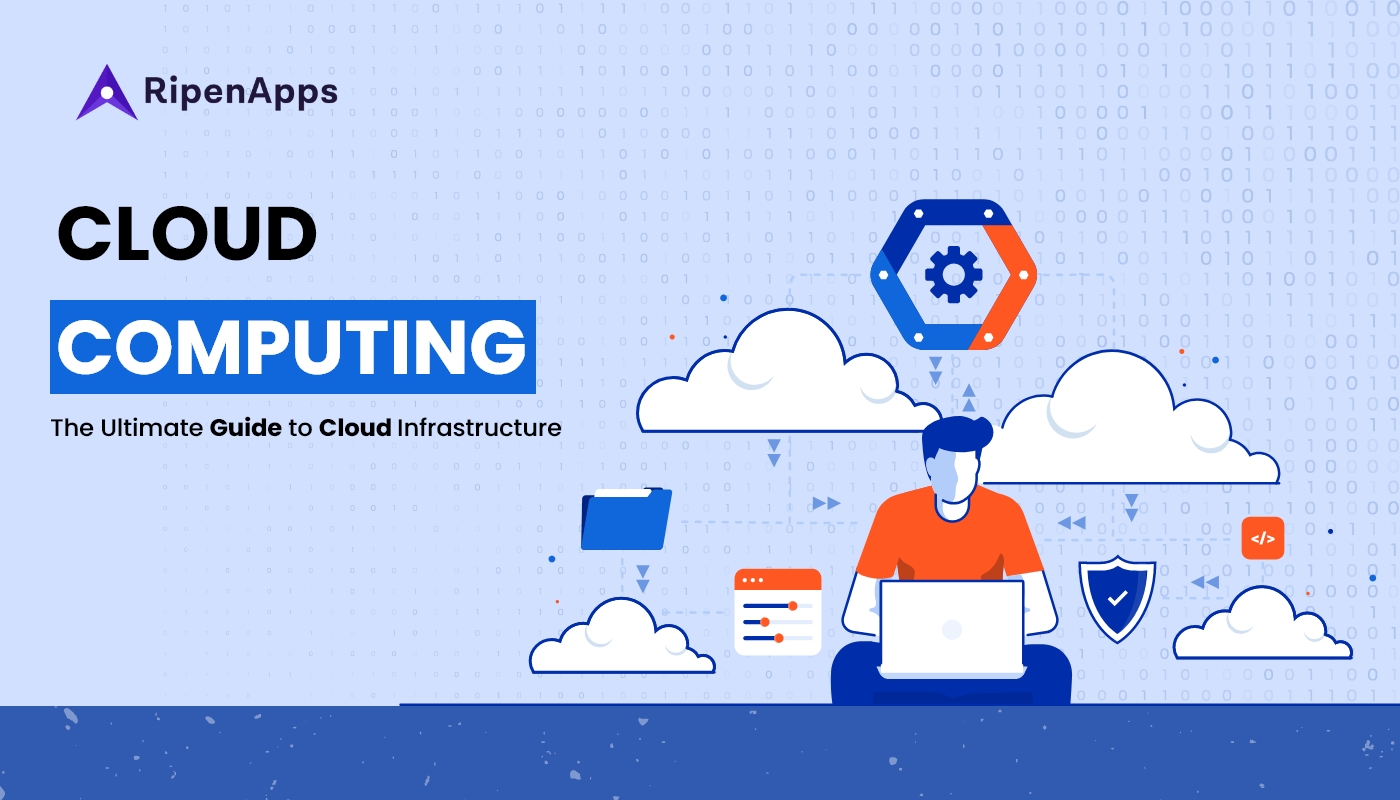The recent pandemic showcased the need and importance of cloud technologies. The work-from-home environment revealed why businesses must leverage the power of cloud computing. Although few organizations are 100% working on a cloud model, whether the private or public cloud, some businesses are still trying to grasp the concept of cloud computing. The increase in flexibility, improved business agility, and a secure ecosystem are a few benefits cloud computing promises. In case you are also trying to understand whether to integrate cloud computing or not, this article is for you.
In this article, we will learn the concept of cloud computing in detail, focusing on the uses of cloud infrastructure, different types of cloud computing, service models, benefits, costs to businesses, and how to choose a cloud solution for your business needs.
Table of Contents
What is Cloud Computing, and How Does it Work?
As a consumer, you must have used Google Drive or Office 365 for personal or professional use at some point. Even mobile apps like Netflix are great examples of cloud streaming. To define the cloud, we can refer to it as a practice of using remote servers to store, manage and process data instead of traditional computer storage. When the data is stored on a server it can be accessed from anywhere at any point in time.
If we look at the graph from 2011 to 2022, the public cloud services worldwide growth increased from 20.8% to 29.3% in 2020. Additionally, the market is expected to grow by 20.4% by the end of 2022, amounting to $495 Billion in revenues. Being that you can imagine how fast businesses are actively trying to integrate cloud services into their ecosystem to achieve agility and flexibility.
Regarding the working of the cloud, organizations have to decentralize their network by converting it to a shared network. Hosting providers take the responsibility of maintaining cloud services. Some organizations sign a service package with mobile app development companies to look after the cloud services. Whatever hosting company you choose, they are further responsible for maintaining the safety and connection to data centers.
The most popular cloud service provider is Amazon web services and Microsoft Azure. Teams in the organization can work on multiple projects live from remote places. Managers can manage the projects and check the progress or communicate with their team members easily.
What Are the Uses of Cloud Computing?
The uses of cloud computing portray strong reasons why companies are transforming their operations to cloud models. Below are the uses of cloud computing, leveraging organizations towards growth.
File Storage
Cloud computing delivers a robust file storage system accessible by authorized parties anytime and anywhere. With an efficient user experience, the process of storing, accessing, modifying, and removing data becomes easy for organizations. Meanwhile, the file storage service stays on demand and is upgradable anytime, according to the requirements of companies.
Communication and Collaboration
Cloud services offer an effective communication method for businesses. Gone are the days when companies relied on the E-mail system for communication. For instance, applications like Skype and Microsoft Teams have provided the prominence of cloud infrastructure. From sharing files to holding meetings, everything is available on-demand to the employees and users associated with companies.
Backup and Disaster Recovery
Storing the files on computer storage is definitely the fastest process to manage files. But you have to keep backing up data to multiple storage devices for the disaster recovery case. At the same time, cloud computing offers an automatic backup service. And organizations do not have to worry about losing their important data.
Big Data Analytics
Cloud computing offers futuristic use cases to businesses. Since data is one of the key elements for the growth of the organization, companies want to use data to leverage their business goals. Cloud infrastructure integrates big data analytic tools for the organization to produce insights for the businesses.
Software Development and Testing
Losing the code due to power failure is a common issue that organizations faced before the advent of cloud technology. Today, mobile app developers and website developers use cloud-based IDEs to build and test apps.
What Are the Different Types of Cloud Computing?
Cloud computing service providers have their own way of implementing cloud solutions for businesses. With these different approaches, cloud computing is divided into multiple types.
Private Cloud
You can imagine what a private cloud is by the name. Private clouds are internal corporate models specifically managed by the organization itself. However, it is also managed by the service providers, but it is maintained on a private network working only on the internal assets of the company. Nobody outside the company can access a private cloud. A survey by technical professionals revealed that 37% of professionals used the Microsoft Azure stack. The prices of private clouds are higher as compared to public clouds because they are highly secure.
Public Cloud
Public clouds are available to the general public because the data is stored on third-party servers. Eventually, service providers are the owners of the cloud, and users availing of the service do not have to worry about its maintenance. Public clouds like IBM cloud and Google app engine are highly used for application development, testing, file exchange, and much more.
Hybrid Cloud
Public and Private cloud models are combined to build a hybrid cloud infrastructure. Basically, this model is highly used by businesses to scale their infrastructure rapidly by utilizing the power of both public and private cloud infrastructure. For example, when there is a high load on the private cloud, then the public cloud’s resources are utilized so that company can meet the high traffic demands of users.
Community Cloud
Communities like universities and government offices use community cloud infrastructure. Users are basically from the same industry sharing the files between their networks. The system is flexible with high-quality security.
What Are the Different Cloud Service Models?
Companies can save up to 30% on resources when they shift to cloud infrastructure. Here are the different types of cloud service models that you can offer or avail as a business.
Software as a Service
The cloud service provider takes care of managing your software, infrastructure, and security of your infrastructure. Generally, the applications reside on the web, where users can log in from anywhere and on any device.
Infrastructure as a Service
Businesses require hardware to perform their processes efficiently. And this hardware needed to be maintained from time to time, costing so much to businesses. With Infrastructure as a service, businesses just have to pay the subscription, and all the hardware needs are performed by the service provider. However, you always have control over your infrastructure.
Platform as a Service
Basically, when you build applications, you need a specific platform to start over. Either you start it from scratch or purchase it as a service. But starting from scratch will cost you more as compared to buying it as a service. Platform as a service delivers a basic foundation to build apps so that businesses can save money and not have to worry about basic setups.
What Are the Benefits of Using Cloud Computing?
Enterprises leverage numerous benefits by using cloud computing. Here are the top benefits of using cloud computing in your infrastructure.
Reduced Operational Costs
When you opt for cloud computing needs then, you are indirectly reducing the cost. The company does not have to hire people to manage its cloud infrastructure. All they have to do is pay a cloud service provider, and they will take care of all their needs.
Boosted Productivity
What can be better than running an organization that runs on the cloud where employees can work live on networks watching live changes? Further, team leaders can better share the information with the team members and monitor it effectively. Altogether, it will no doubt boost the overall productivity of the organization.
Better Security
From no worries about disaster recovery to authorizing users to access information, cloud computing delivers a strong security model to enterprises. Enterprises do not have to worry about system crashes since everything stays on the web. A refresh is all you need to get back to work. Further, cloud service providers integrate strong security for data theft and unauthorized access.
Modern Working Environment
Who wants to work with specific hardware requirements? Digital transformation is making remote work possible where the server’s hardware requirements are shared with its user’s computer through the web. It delivers a positive work culture.
How to Choose the Best Cloud Computing Solution?
While choosing the best cloud computing solution for you, you must answer a few of the questions. Here is the list of questions to ask for a better cloud computing choice.
- Identify the needs of your enterprise.
- Research on the cloud computing service providers.
- What certificates does the Cloud service provider hold?
- Will the services offered by cloud service providers align with my organization’s culture and ecosystem?
- Is the cloud service provider following government policies sincerely?
- What level of security is offered by the cloud service provider?
What is the Cost of Cloud Computing Infrastructure?
Well, all the cloud infrastructure providers work on different models and have their own prices, so it is not possible to quote a fixed price. Yet, the typical cost of cloud storage starts from $10-50/per user. But definitely, as an enterprise, you have to pay for external services like a high level of security as shown above. So, we advise you to consult with cloud service providers to get the exact quote of prices.
FAQs
Q1. Should I use cloud computing for my enterprises?
Yes, cloud computing will deliver the desired flexibility in your infrastructure. Cloud computing is a modern trend and offers some great benefits to businesses.
Q2. What are the benefits of cloud computing to businesses?
Cloud computing offers a modern infrastructure to your business. You do not have to worry about looking at your data, and the team members can work on multiple projects together, offering team leaders a better organization of projects.
Q3. What is the cost of integrating cloud computing into infrastructure?
Different businesses take a different approaches toward cloud computing. For example, the public, private, and community cloud rates differ. Further, if you have customized requirements, that, too, will alter your overall cost. So, you must check out the prices on the official websites of your desired cloud service partner.
Q4. What are the different types of cloud computing models?
There are three types of cloud computing models; public, private, and community cloud models. Private cloud computing is beneficial to companies that want to integrate cloud systems in their internal environment. Public clouds are best if you want to offer something on the cloud to your users. Government offices highly use community clouds.
Q5. How cloud computing will provide value to my business?
Cloud computing reduces the cost of maintaining hardware services for organizations. With the power of cloud technology, enterprises can take benefit from better security and remote access to data.
Q6. What kind of businesses must adopt cloud computing?
Businesses working as data centers must adopt cloud computing. If you collect, process, and analyze data as your primary task, this technology will offer the security of backing up all the necessary data.











 India
India USA
USA Australia
Australia Canada
Canada UK
UK UAE
UAE
